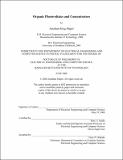Organic photovoltaics and concentrators
Author(s)
Mapel, Jonathan King
DownloadFull printable version (3.685Mb)
Other Contributors
Massachusetts Institute of Technology. Dept. of Electrical Engineering and Computer Science.
Advisor
Marc A. Baldo.
Terms of use
Metadata
Show full item recordAbstract
The separation of light harvesting and charge generation offers several advantages in the design of organic photovoltaics and organic solar concentrators for the ultimate end goal of achieving a lower cost solar electric conversion. In this work, we explore two new device architectures. In antenna organic solar cells, we utilize external energy transfer mediated by surface plasmon polaritons to increase the efficiency of existing organic photovoltaic devices limited in performance by the exciton diffusion bottleneck. This unique architecture is analyzed for its functionality and the efficiencies of each added step is quantified. Although the introduction of additional energy transduction will ultimately introduce more losses, bypassing the exciton diffusion bottleneck offers the potential for increased efficiency through judicious device design. We also seek to enable the use of high efficiency inorganic solar cells in organic solar concentrators which aim to exploit high performance of the PV cells in low cost, nontracking configurations. By utilizing thin films of organic chromophores on high refractive index glass substrates, we are able to apply the recent advances of organic optoelectonics to the fluorescent concentrator platform, including near field energy transfer, solid state solvation, and phosphorescence. By reducing self-absorption losses, we demonstrate optical flux gains an order of magnitude greater than previously published results and thereby reduce the effective cost of inorganic solar cells by at least a factor of ten. Combined with the potential for low cost solution processing, the high flux gains and power efficiencies realized here should enable a new source of inexpensive solar power.
Description
Thesis (Ph. D.)--Massachusetts Institute of Technology, Dept. of Electrical Engineering and Computer Science, 2008. This electronic version was submitted by the student author. The certified thesis is available in the Institute Archives and Special Collections. Includes bibliographical references (p. 158-169).
Date issued
2008Department
Massachusetts Institute of Technology. Department of Electrical Engineering and Computer SciencePublisher
Massachusetts Institute of Technology
Keywords
Electrical Engineering and Computer Science.